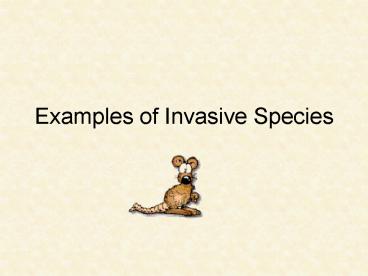Examples of Invasive Species - PowerPoint PPT Presentation
1 / 12
Title:
Examples of Invasive Species
Description:
Channa argus ... man caught a strange fish in Maryland, and handed over ... The fish that he had caught and re-released in Crofton was soon identified as a ... – PowerPoint PPT presentation
Number of Views:330
Avg rating:3.0/5.0
Title: Examples of Invasive Species
1
Examples of Invasive Species
2
Rabbits Introduced to Australia and New Zealand
have no natural predators
3
Tree-of-heaven, Ailanthus altissima
- It grows very quickly, and competes aggressively
for sunlight in newly developing forests.
4
Purple Loosestrife, Lythrum salicaria,
- Attempts to dig it out usually backfire because
purple loosestrife resprouts from root fragments
disturbing the soil just provides more room for
it to spread
5
Kudzu Pueraria lobata
- Kudzu is a vine that when left uncontrolled will
eventually grow over almost any fixed object in
its proximity including other vegetation. Kudzu,
over a period of several years will kill trees by
blocking the sunlight
6
Asian Tiger MosquitoAedes albopictus
- Arrived accidentally in tires imported from Japan
- Can transmit viruses such as Eastern equine
encephalitis and West Nile virus
7
European Gypsy MothLymantria dispar
- imported for silk production in 1869
- Defoliates trees
8
Burmese PythonPython molurus bivittatus
- An American alligator and a Burmese python locked
in a struggle to prevail in Everglades National
Park. - This python appears to be losing, but snakes in
similar situations have apparently escaped
unharmed, and in other situations pythons have
eaten alligators. Photo by Lori Oberhofer,
National Park Service.
9
Northern Snakehead Channa argus
- May 2002, a fisher man caught a strange fish in
Maryland, and handed over a photograph of it to a
government office in Annapolis. The fish that he
had caught and re-released in Crofton was soon
identified as a Northern Snakehead, native to
China
http//www.waterencyclopedia.com/Oc-Po/Pollution-b
y-Invasive-Species.html
10
Zebra Mussels Dreissena polymorpha
- originated in the Balkans, Poland, and areas
within the former Soviet Union. - The species was accidentally introduced into the
Great Lakes in 1988 via the ballast water of
ships. - By 1990, it had spread to all the Great Lakes. In
1991, zebra mussels escaped the Great Lakes Basin
and found their way into the Illinois River,
giving them access to the entire Mississippi
River Basin. - As of 2002, they had expanded further, and were
found from Virginia to New York, bringing the
total number of states with documented
occurrences to twenty three.
11
Wanted Poster
12
http//video.nationalgeographic.com/video/player/k
ids/animals-pets-kids/reptiles-kids/snake-two-head
ed-kids.html?sourceG2114c































